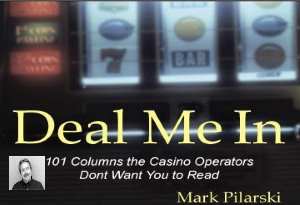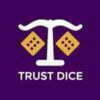In the past, individuals have written you asking specific questions about Caribbean Stud Poker. Could you please give a brief explanation of how the game is played, its downside and is it really as popular as everyone says? Donald B.
The basic objective of this five-card stud poker game is to beat the dealer’s hand. To play, you must first place an ante bet in the circle. Let’s use a $5 ante wager as our example. You then receive five cards dealt face down, and the dealer gets four cards face down and one card exposed. If you feel your 5 cards can beat the dealer’s hand, you then place an additional bet equaling twice your ante ($10). Otherwise, you fold and lose your original $5. All that remains is beating the dealer’s hand and you win! Well, not so fast my friend.
If the dealer doesn’t have at least a king plus an ace to open, all you win is even money on your $5 ante wager. True, there is a bonus payout schedule for hands ranging from one pair to a royal flush when the dealer’s hand is in play, but when I’ve got 15 buckaroos on the table at risk, I want a $15 payoff if the dealer is forced to fold. There, Donald, is your downside.
As for its popularity, Donald, no argument from me that Caribbean Stud is one of the fastest growing table games today. Many players believe the attractive payback percentage and the added thrill of a progressive jackpot is just too hard to resist. But smart gamblers-those who stick with wagers that have less than a 2% house advantage-realize the house wins two ways: off the basic game percentage (5.3%) and as a percentage return (48%) of the popular progressive bet.
My mother and I just discovered the joys of playing bingo at an Indian reservation. Our problem is that if we play more than two cards at one time, we’re overwhelmed. Any suggestions? Marion E.
Save the mind labor, Marion, and join the cybernetic age. Most Indian reservation bingo parlors rent out computers (for a nominal price) that automatically track up to 12 bingo cards at one time. When a number is called, you one-touch a video bingo screen, and a computer searches for the number on all your cards, then imprints the correct spot for the game theme or pattern you are playing.
For the laggards like yours truly, it’s heaven sent.
I can’t wait for gambling to come to Detroit. Do you think with just three casinos, there will be enough competition to benefit the player? Benny D.
A resounding NO, and here’s why. The precipitous price for those three casino licensees will have to be absorbed by the unwilling and unknowing player. For starters, a state gaming tax of 18 percent of the casino profits was set by Michigan’s Proposition E referendum. Next, add an additional $25 million a year to the Michigan Gaming Control Board, plus $5 million for compulsive gambling. State legislators also enacted laws that require each licensee to pay more than $8 million in annual fees. As the Consumer Price Index increases, so do the service fees. The casinos must also pay an additional annual municipal fee of 1.25 percent of the adjusted gross receipts, or $4 million, whichever is greater.
Now if you think the Lords of Chance will be footing the bill for the price of a casino license-the highest amount extracted yet from any casino operator-lose the tears. They’ll sulk like a 10-year-old when they have to fork over so much money, but whose pocket will they really take it out of? YOURS. How? By oppressive rules in blackjack, sky-high limits at table games, tight video poker machines and even tighter cybernetic one-armed bandits.
Welcome, Detroit, my hometown, to what I believe will be some of the highest table limits and toughest odds nationwide. For the customers’ sake, I hope I’m wrong and will have to digest these words.




















